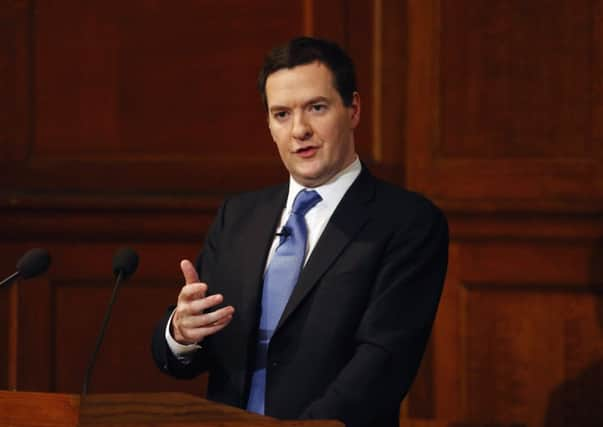Osborne signals minimum wage rise of £7 an hour


In an indication of what might appear in his Budget in March, Mr Osborne said he is prepared to consider increasing the minimum wage from £6.31 an hour for people over the age of 21 to £7 an hour.
The move comes after pressure from members of his own party for the Tories to embrace the minimum wage, which they opposed during the 1990s.
Advertisement
Hide AdAdvertisement
Hide AdThe current rate of inflation is 2 per cent and the minimum wage has fallen in real terms since the economic crisis began in 2008. Currently, an estimated 1.35 million workers in the UK are paid the wage.
Speaking to the BBC, Mr Osborne said: “I think Britain can afford a higher minimum wage. I think we have worked hard to get to this point and we can start to enjoy the fruits of all that hard work. Because we are fixing the economy, because we are working through our plan I believe Britain can afford an above-inflation increase in the minimum wage. The exact figure has to be set by the Low Pay Commission. “I think we can see an above-inflation increase in the minimum wage and do it in a way that actually supports our economy.”
The Chancellor’s comments came just days after he warned against a “self-defeating” increase in the minimum wage rate to a level that would cost jobs.
The independent Low Pay Commission (LPC), which is overseen by Liberal Democrat Business Secretary Vince Cable, includes representatives of business, unions and academia.
It is due to make its recommendations on the level of the minimum wage and its potential impact on jobs next month. Any upgrade would be expected to take effect in the autumn.
In a signal that ministers were hoping for a generous increase, Mr Cable asked the LPC last September to carry out an additional assessment of the economic conditions that would allow for faster increases without an adverse effect on jobs.
Submitting his analysis, Mr Cable left little doubt that he believes an above-inflation rise is possible, saying that the benefits of recovery should be “shared fairly”.
Mr Cable said: “The national minimum wage is designed to strike a balance between protecting the low paid and making sure they can find work. But as the economy starts to recover, the benefits of growth must be shared fairly.”
Advertisement
Hide AdAdvertisement
Hide AdAny above-inflation rise in the main rate for adults would be likely to be reflected in the £5.03-an-hour rate for 18-20- year-olds and £3.72 for under 18s.
The move has been opposed by organisations such as the Institute of Directors and the CBI who have argued that it means firms will employ fewer people.
Chris Leslie MP, the shadow chief secretary to the Treasury, said: “The Tories can’t hide from the fact that working people are on average £1,600 a year worse off since they came to office.”